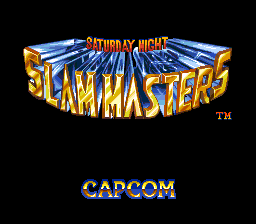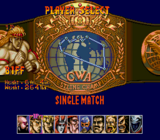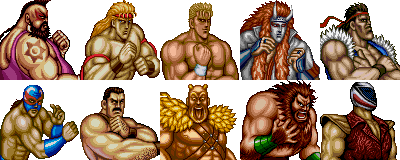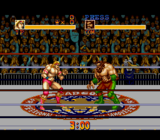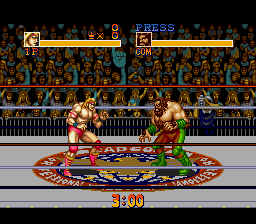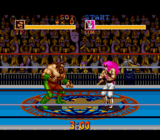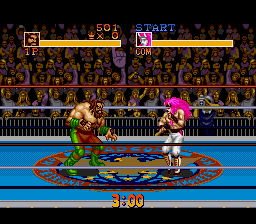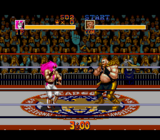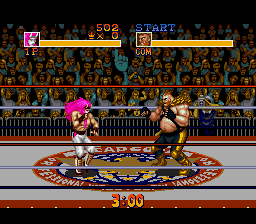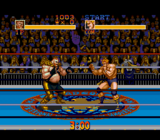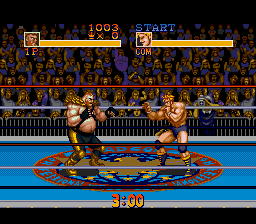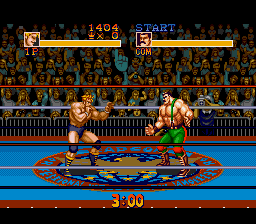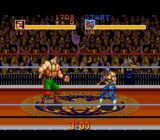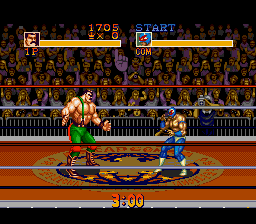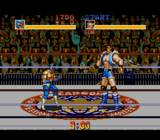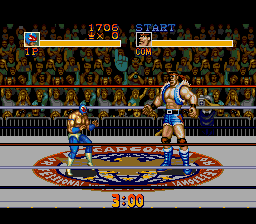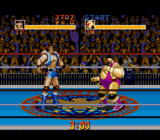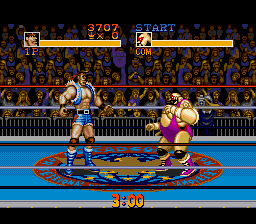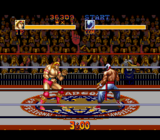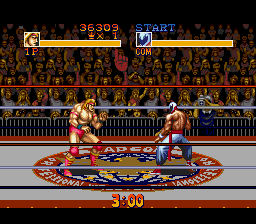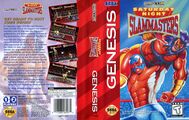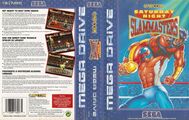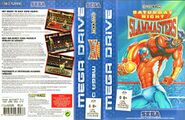Saturday Night Slam Masters
From Sega Retro
| Saturday Night Slam Masters | |||||||||||||||||||||||||
|---|---|---|---|---|---|---|---|---|---|---|---|---|---|---|---|---|---|---|---|---|---|---|---|---|---|
| System(s): Sega Mega Drive | |||||||||||||||||||||||||
| Publisher: Capcom | |||||||||||||||||||||||||
| Developer: Capcom | |||||||||||||||||||||||||
| Distributor: Sega-Ozisoft (AU) | |||||||||||||||||||||||||
| Original system(s): Capcom CPS-1 | |||||||||||||||||||||||||
| Genre: Action | |||||||||||||||||||||||||
| Number of players: 1-2 | |||||||||||||||||||||||||
| |||||||||||||||||||||||||
|
Saturday Night Slam Masters is a hybrid fighting and wrestling arcade game developed by Capcom, originally released for Capcom's CP System Dash arcade hardware in July 1993. It was ported to the Sega Mega Drive and Super NES the following year.
In Japan, the game is typically known as Muscle Bomber: The Body Explosion, although the Mega Drive port was not released in that region. Nevertheless, during development, the game featured at Summer CES 1994 under the working title of Muscle Bomber, which may suggest that a Japanese version was planned.
The game features artwork by manga artist Tetsuo Hara, known for Fist of the North Star.
Contents
Gameplay
Saturday Night Slam Masters mixes up Capcom's one-on-one fighting system seen in games like Street Fighter II with the rules of professional wrestling. Matches are fought in a ring with a vertical plane similar to a beat-'em-up.
Wrestlers move around the ring with the D-Pad and jump with ![]() . They attack with
. They attack with ![]() , which includes punches and kicks. Each character has two special attacks: a non-grappling technique and a "Super Slam Technique" that can be used when the opponent is grabbed. They run with
, which includes punches and kicks. Each character has two special attacks: a non-grappling technique and a "Super Slam Technique" that can be used when the opponent is grabbed. They run with ![]()
![]() or
or ![]()
![]() and can perform attacks (such as dashing kicks or clotheslines, depending on the character) while running.
and can perform attacks (such as dashing kicks or clotheslines, depending on the character) while running.
Wrestlers can step out of the ring by pressing any direction twice (except ![]() ) while standing near the ropes, but they can only remain out of the ring for 20 seconds before forfeiting the match by count out. Objects such as bottles and folding chairs can be found outside the ring and picked up with
) while standing near the ropes, but they can only remain out of the ring for 20 seconds before forfeiting the match by count out. Objects such as bottles and folding chairs can be found outside the ring and picked up with ![]() , then swung as a weapon with
, then swung as a weapon with ![]() again or thrown with
again or thrown with ![]() after jumping. Objects can be thrown into the ring from the sides. It is also possible to climb the turnbuckles by double-tapping one of the diagonal directions when standing in front of one. While standing on a turnbuckle, the wrestler can taunt with
after jumping. Objects can be thrown into the ring from the sides. It is also possible to climb the turnbuckles by double-tapping one of the diagonal directions when standing in front of one. While standing on a turnbuckle, the wrestler can taunt with ![]() or jump off with
or jump off with ![]() .
.
A wrestler can grab an opponent by holding the D-Pad toward the opponent and pressing ![]() . While grabbing, the wrestler can then perform a slam, pin, or other technique by pressing
. While grabbing, the wrestler can then perform a slam, pin, or other technique by pressing ![]() ,
, ![]() +
+![]() , or
, or ![]() +
+![]() or throw the opponent into the ropes with
or throw the opponent into the ropes with ![]() +
+![]() or
or ![]() +
+![]() . Opponents can be grabbed from the front or the back, which affects the moves that can be performed. Every wrestler has a special Super Slam Technique that can be performed with a button combination while the opponent is in a hold.
. Opponents can be grabbed from the front or the back, which affects the moves that can be performed. Every wrestler has a special Super Slam Technique that can be performed with a button combination while the opponent is in a hold.
When a wrestler has hit the mat, his opponent can pin him with ![]() when standing over him if he is lying face up (otherwise, he can be flipped with
when standing over him if he is lying face up (otherwise, he can be flipped with ![]() if he is lying face down). Opponents can also be attacked while prone (including jump attacks). A wrestlers can try to escape a grab or a pin by moving the D-Pad and pressing the buttons rapidly; the other wrestler can try to lock an opponent in a pin the same way. It is harder to escape a hold if grabbed from behind. A wrestler's chances of escaping a pin decrease as his life decreases, and a wrestler cannot escape a pin at all if he has no life remaining. A wrestler loses a match if pinned for a count of three seconds or counted out while outside the ring. Additionally, matches are timed, and the wrestler with the most life remaining wins the match if time runs out.
if he is lying face down). Opponents can also be attacked while prone (including jump attacks). A wrestlers can try to escape a grab or a pin by moving the D-Pad and pressing the buttons rapidly; the other wrestler can try to lock an opponent in a pin the same way. It is harder to escape a hold if grabbed from behind. A wrestler's chances of escaping a pin decrease as his life decreases, and a wrestler cannot escape a pin at all if he has no life remaining. A wrestler loses a match if pinned for a count of three seconds or counted out while outside the ring. Additionally, matches are timed, and the wrestler with the most life remaining wins the match if time runs out.
Wrestlers become enraged after being hit repeatedly, which is indicated by a red hue. Their attacks do more damage and they can escape grabs more easily while the effect lasts.
Modes
There are three game modes. The single-player Single Match mode has the player travel to nine different cities around the world to fight a series of one-on-one matches against computer-controlled characters. The final two opponents are the bosses Jumbo "Flap" Jack and the Scorpion (unless playing as one of those characters, in which case that match is substituted for whichever remaining character has not been fought, as there are no mirror matches where a character fights himself). Defeating all of the other wrestlers results in winning the championship belt, which must then be defended against the entire roster (meaning every character must be defeated twice in order to finish the game).
There is a two-player Vs. Mode where each player chooses a wrestler and competes in single matches against each other. Players can choose the same wrestler in this mode. There is also a two-player Death Match Mode, which is the same as the Vs. Mode, except the ropes of the ring are replaced with barbed wire that damages opponents who are thrown into it and weapons appear inside the ring.
Characters
Note: Move lists assume that the character is facing right. When facing left, ![]() and
and ![]() should be reversed.
should be reversed.
| ATTACK | Any attack button |
| JUMP | Jump |
Each wrestler has his own unique entrance music and animation at the beginning of the match.
|
Height: 6'4" Weight: 264 lbs. | |||||||||
A Russian wrestler who trained under Haggar alongside his rival, Gunloc. His loss quote makes reference to "Comrade Zangief," from Street Fighter II.
| |||||||||
|
Height: 6'4" Weight: 276 lbs. | |||||||||
Another apprentice of Haggar and the rival of Biff. He is described as "related to a famous street fighter."
| |||||||||
|
Height: 6'0" Weight: 221 lbs. | |||||||||
A Japanese wrestler who dresses with a kabuki-like theme.
| |||||||||
|
Height: 7'9" Weight: 432 lbs. | |||||||||
| A huge English wrestler who uses both his size and strength to intimidate his opponents. | |||||||||
|
Height: 5'6" Weight: 163 lbs. | |||||||||
| A Mexican luchador who amazes the crowds with his high-flying speed and techniques. | |||||||||
|
Height: 6'7" Weight: 309 lbs. | |||||||||
One of the main characters from Final Fight, where he was the mayor of Metro City. His daughter, Jessica (also from Final Fight), enters into the ring to celebrate with him when he wins a match.
| |||||||||
|
Height: 6'6" Weight: 359 lbs. | |||||||||
| An Australian wrestler who has a merciless attitude in the ring. | |||||||||
|
Height: 6'6" Weight: 331 lbs. | |||||||||
| A wild and feral-like man who acts like a savage beast in combat. He is accompanied by his "manager," a pet monkey named Freak. | |||||||||
|
Height: 6'5" Weight: 410 lbs. | |||||||||
| A large and sadistic wrestler who enjoys making his opponents bleed. He is the right-hand man of the Scorpion and the penultimate boss of the game. | |||||||||
| The Scorpion | |||||||||
|
Height: 6'2" Weight: 280 lbs. | |||||||||
| A mysterious masked wrestler whose true identity and history is shrouded in both mystery and darkness. He is the final boss of the game. |
Stages
There are nine locations, played in order. Each stage uses the same backdrop but with a different color palette.
Versions
The Mega Drive version allows players to use the full character roster, including bosses, in single-player mode, and features a Death Match mode exclusive to the system. However, possibly due to colour palette restrictions, the four-player tag team mode present in the Super NES version (where a multi-tap is needed) is omitted.
Magazine articles
- Main article: Saturday Night Slam Masters/Magazine articles.
Promotional material
Physical scans
| Sega Retro Average | ||||||||||||||||||||||||||||||||||||||||||||||||||||||||||||||||||||||||||
|---|---|---|---|---|---|---|---|---|---|---|---|---|---|---|---|---|---|---|---|---|---|---|---|---|---|---|---|---|---|---|---|---|---|---|---|---|---|---|---|---|---|---|---|---|---|---|---|---|---|---|---|---|---|---|---|---|---|---|---|---|---|---|---|---|---|---|---|---|---|---|---|---|---|---|
|
| 60 | |
|---|---|
| Based on 14 reviews | |
Technical information
- Main article: Saturday Night Slam Masters/Technical information.
References
- ↑ Game Players, "Vol. 7 No. 10 October 1994" (US; 1994-xx-xx), page 14
- ↑ 2.0 2.1 File:NewReleasesCatalogueApril-May1995AU.pdf, page 13
- ↑ 1700 igr dlya Sega, "" (RU; 2001-xx-xx), page 199
- ↑ Electronic Games (1992-1995), "July 1995" (US; 1995-0x-xx), page 62
- ↑ GameFan, "Volume 3, Issue 5: May 1995" (US; 1995-xx-xx), page 16
- ↑ GamesMaster, "June 1995" (UK; 1995-05-11), page 53
- ↑ MAN!AC, "05/95" (DE; 1995-04-12), page 69
- ↑ Mega Fun, "05/95" (DE; 1995-04-19), page 76
- ↑ Next Generation, "June 1995" (US; 1995-05-23), page 113
- ↑ Player One, "Juillet/Août 1995" (FR; 1995-0x-xx), page 117
- ↑ Sega Power, "June 1995" (UK; 1995-04-20), page 59
- ↑ Sega Pro, "May 1995" (UK; 1995-04-13), page 84
- ↑ Sega Force, "2/95" (SE; 1995-04-19), page 38
- ↑ Todo Sega, "Julio 1995" (ES; 1995-0x-xx), page 53
- ↑ Tricks 16 bit, "Tricks Sega Gold 800 igr" (RU; 1998-03-20), page 223
- ↑ Video Games, "9/95" (DE; 1995-08-30), page 101
| Saturday Night Slam Masters | |
|---|---|
|
Main page | Comparisons | Development | Magazine articles | Reception | Region coding | Technical information | |
| Final Fight games for Sega systems | |
|---|---|
| Final Fight CD (1993) | |
| Final Fight Revenge (1999) | |
| Related games | |
| Saturday Night Slam Masters (1994) | |
| Street Fighter Alpha: Warriors' Dreams (1996) | Street Fighter Alpha 2 (Dash) (1996) | Street Fighter Collection (1997) | Street Fighter Zero 3 (1999) | |
| Street Fighter Alpha 3 (1999) | |
